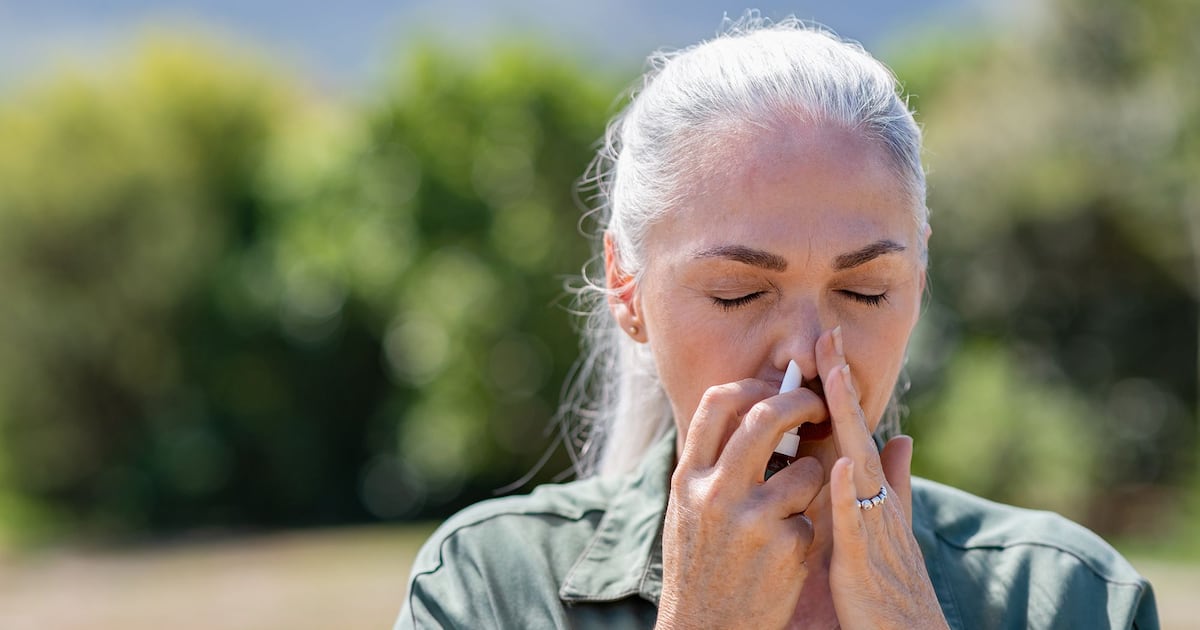Health
Common Nasal Spray Shows Promise in Preventing Covid-19

A recent study has revealed that a common nasal spray, azelastine, may significantly reduce the risk of contracting Covid-19. The findings, published in the journal JAMA Internal Medicine on September 2, 2023, stem from a randomized placebo-controlled trial involving 450 healthy adults in Germany. Researchers observed that those using azelastine had about three times lower chances of developing Covid-19 compared to those receiving a placebo.
The study’s implications raise important questions about the potential repurposing of existing medications in the ongoing fight against Covid-19. To gain further insights into azelastine and its relevance to public health, I spoke with Dr. Leana Wen, an emergency physician and clinical associate professor at George Washington University, who previously served as Baltimore’s health commissioner.
Understanding Azelastine and Its Approval
Azelastine nasal spray, marketed under the brand names Astelin and Astepro, is an antihistamine primarily used to alleviate symptoms of allergies, such as runny nose and sneezing. It is approved for treating both seasonal and perennial allergic rhinitis. Seasonal allergic rhinitis typically manifests during specific times of the year when pollen is prevalent, while perennial allergic rhinitis can occur year-round due to triggers like dust mites and pet dander. Initially approved by the U.S. Food and Drug Administration (FDA) in 1996, azelastine is now also available in generic forms, although a prescription is generally required. Notably, the brand Astepro Allergy is available over the counter.
Dr. Wen explained that the interest in using azelastine to prevent respiratory illnesses arose early in the pandemic. Preliminary laboratory studies indicated that azelastine might block a receptor used by the coronavirus to enter human cells. Further research suggested its ability to lower virus levels in nasal tissue and potentially combat other respiratory viruses, including influenza.
Study Design and Key Findings
The clinical trial in question was a double-blind, placebo-controlled phase 2 study, involving a diverse group of participants, with 99.1 percent having received at least one Covid-19 vaccine dose. Participants were divided into two groups; one received azelastine nasal spray three times daily for an average of 56 days, while the other group received a placebo.
Testing for Covid-19 was conducted bi-weekly using rapid antigen tests, confirmed by laboratory polymerase chain reaction (PCR) testing. Results showed that only 2.2 percent of participants in the azelastine group tested positive for Covid-19, compared to 6.7 percent in the placebo group. Additionally, the average duration of positive tests was shorter for those using azelastine, lasting 3.40 days compared to 5.14 days for the placebo group. Participants using azelastine also exhibited lower incidence rates of other respiratory viruses, with 8.4 percent of the azelastine group contracting any tested viruses compared to 18.8 percent in the placebo group.
Dr. Wen characterized the study as well-designed and emphasized the potential of azelastine to serve as a preventive treatment against infections. She noted that the reduction in Covid-19 infection rates is comparable to the effectiveness seen with vaccination, and highlighted the medication’s affordability and established safety profile.
While these findings are promising, Dr. Wen advised caution. The FDA has yet to approve azelastine for Covid-19 prevention or for any other infectious disease. She emphasized that individuals should continue relying on established preventive measures, such as vaccination and wearing masks, particularly in crowded indoor settings.
As Covid-19 cases surge in some regions, Dr. Wen recommends that those eligible should seek the updated Covid-19 vaccine. Vulnerable populations should avoid crowded spaces, and if unavoidable, consider using a well-fitting N95 mask. It is crucial for anyone showing respiratory symptoms to remain at home to mitigate the spread of both Covid-19 and other respiratory illnesses.
The study of azelastine represents an important step in expanding the arsenal of preventive measures against Covid-19, with further research needed to validate its efficacy as a widely adopted treatment option.
-

 Science3 months ago
Science3 months agoToyoake City Proposes Daily Two-Hour Smartphone Use Limit
-

 Top Stories3 months ago
Top Stories3 months agoPedestrian Fatally Injured in Esquimalt Collision on August 14
-

 Health3 months ago
Health3 months agoB.C. Review Reveals Urgent Need for Rare-Disease Drug Reforms
-

 Technology3 months ago
Technology3 months agoDark Adventure Game “Bye Sweet Carole” Set for October Release
-

 World3 months ago
World3 months agoJimmy Lai’s Defense Challenges Charges Under National Security Law
-

 Lifestyle3 months ago
Lifestyle3 months agoVictoria’s Pop-Up Shop Shines Light on B.C.’s Wolf Cull
-

 Technology3 months ago
Technology3 months agoKonami Revives Iconic Metal Gear Solid Delta Ahead of Release
-

 Technology3 months ago
Technology3 months agoApple Expands Self-Service Repair Program to Canada
-

 Technology3 months ago
Technology3 months agoSnapmaker U1 Color 3D Printer Redefines Speed and Sustainability
-

 Technology3 months ago
Technology3 months agoAION Folding Knife: Redefining EDC Design with Premium Materials
-

 Business3 months ago
Business3 months agoGordon Murray Automotive Unveils S1 LM and Le Mans GTR at Monterey
-

 Technology3 months ago
Technology3 months agoSolve Today’s Wordle Challenge: Hints and Answer for August 19









